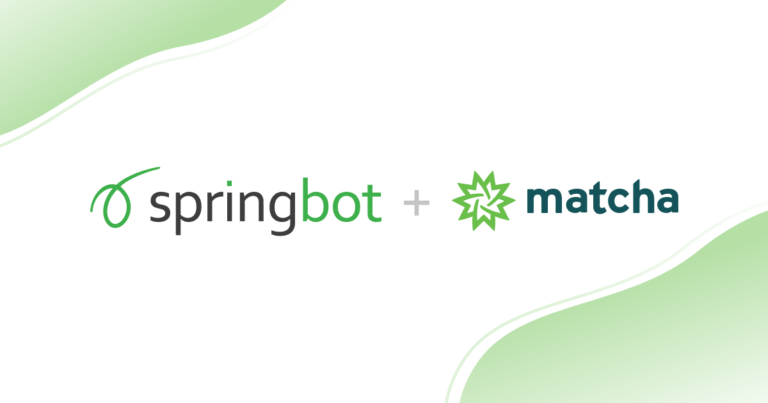With the e-learning industry projected to be worth $325 billion by 2025, it is fair to assume we’ll continue to see new players in the online course market. However, with more online course platform options come some level of confusion when one has to decide the best online course platform for their business.
In this guide, I am gonna walk you through a step-by-step process on how to choose the best online course platform for your business.
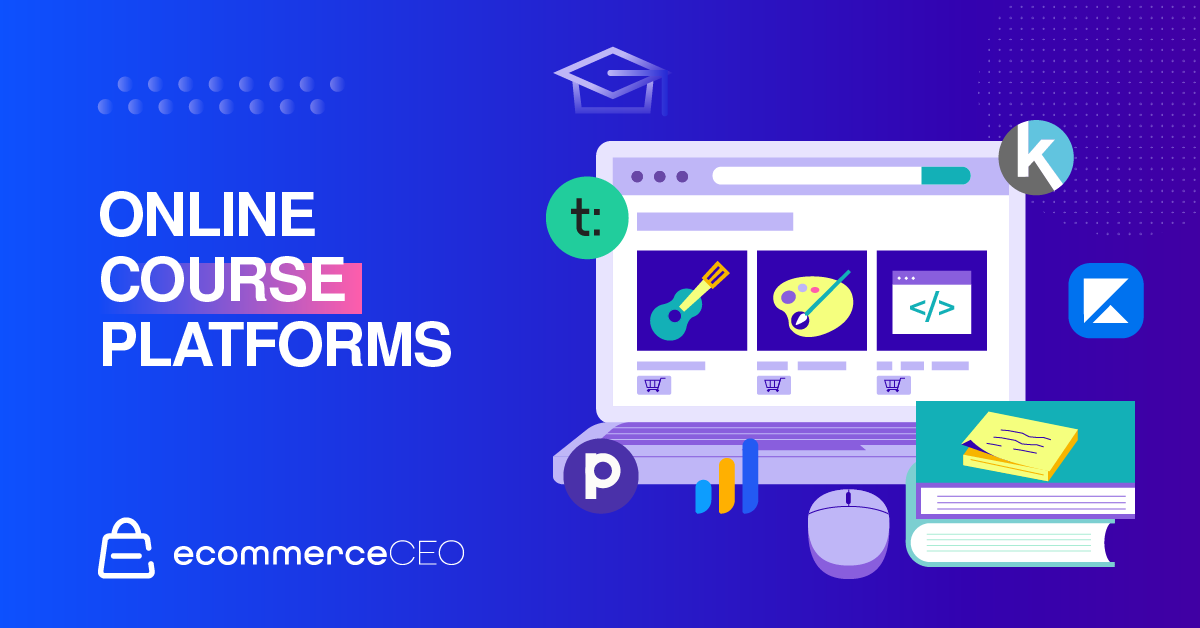
Unlike many who claim experience in this field, I have personally used many of these tools over the years and can rightfully claim a “first-hand experience” with what I’ll share with you today.
From Kartra to LearnDash to Kajabi, I have successfully created and sold courses on several platforms. I also take a ton of online courses and have used nearly all of these platforms as a paid course member.
Briefly here is what I’ll cover in this guide:
- What exactly are online course platforms
- Online learning platforms vs online course platforms
- Understanding different types of online course platforms
- Choosing an online course platform for your business
- And a lot more…
So, you’re ready to monetize your skills with online courses? Then you’ll love this all-inclusive guide on choosing the best online course platform.
Let’s jump right in.
1. What Are Online Course Platforms?
Online course platforms are cloud-based software applications that sell software as a service (SaaS), usually on subscription-based pricing, to end-users and give them the tools and resources to create, launch, market, and sell online courses.
These platforms come in different shapes, sizes and forms.
Some platforms are ideal for only creating online courses but you’ll have to do your own selling. Some of these include the likes of Thinkific, Teachable, Kajabi, Kartra.
Others are more like marketplaces, that is, you can create and sell courses on the same platform. Think of Coursera, Udemy, Skillshare, EdX.
While others are more ideal for creating internal training for companies or curriculum for schools – like Learnworld, LearnDash, etc.
2. What Makes a Great Online Course Platform?
First off, let me come out straight and make this one point clear:
When it comes to online course platforms, I do not think you have to think of it as which platform is the “best”, but rather, think of it as which platform may be “best for me” considering my budget, current following, earning potential or perhaps even time constraints.
What makes a great online course platform for you may not be the same for another.
Case in point:
Let’s take Kajabi for example. If you’re a blogger looking for a platform to sell courses to your audience, while Kajabi may do the job just fine, it may not be the most cost-effective option. A simpler and cheaper alternative like Thinkific may do just as well at a much lower price point.
As such, it’s important to understand not only your needs but also what features these platforms have to offer and at what pricing in order to make an informed decision.
And that is why we’re going to lay bare all the pros and cons, features and functions, pricing and payment, etc. of all online course platforms so you can easily know which one will be ideal for you.
Course Platform Overview
A good starting point to creating effective online courses is understanding the type of online course you want to create. While most online course platforms offer a wide variety of course types, there are some slight differences you may wanna be aware of.
Platform Overview
Pricing and Value
Student Assessment
If you’re building a school where you need to give students assignments or exams, student assessment features will be some of the most important factors to consider. Here is how these platforms compare with learner assessment features.
Marketing And Sales
Advanced Course Features
The features below may not be the “break it or make it” factors but can make all the difference between effective content delivery and a blunt one. The following table shows some of the differences between them.
Advanced Features
Marketing And Sales
While some companies create courses for their own internal training, most create courses to boost their bottom line. Some of the biggest differences with these platforms lie with their marketing and sales features. Here is a quick look at some major differences:
Marketing And Sales
Ease Of Use
It’s one thing all the features you’re looking for in an online course platform, but totally a different thing how to find and use those features. Depending on your tech-savviness, you want to choose a platform that makes it a lot easier for you.
Ease of Use
3. Types of Online Course Platforms
Understandably, there are different types of online course platforms, all designed to serve different consumer needs.
Some, like Teachable, Thinkific, are ideal for small-time creators, hobbyists, bloggers, etc., but others are created more towards high-end course creators like marketers, business owners, corporations, schools, and the likes.
- Specialty Platforms – These platforms do one thing and they do it right, i.e. give you the tools to create and launch online courses. While they do have some necessary marketing and selling features, they do not offer a full-on suite such as funnels, landing pages, emails, etc. that other high-end platforms offer. These include the likes of Thinkific, Teachable, LearnWorlds.
- All-in-one Platforms – These course platforms do more than creating and launching online courses. In addition, they offer you advanced marketing and selling features such as pipelines, webinars, leads tracking, blogs, etc. With all these advanced features, these platforms tend to be pricey and somewhat have a steep learning curve. Think of Kajabi, Kartra and Podia.
- Marketplaces Platforms – These platforms allow you to have access to millions of potential customers on their platforms, and in return, you may have to relinquish flexibility and freedom in terms of pricing, user data, marketing, etc. Udemy, Coursera, Skillshare are some of them.
- LMS WordPress Plugin Platforms – These are WordPress compatible learning management systems. If you want to create online courses using the WordPress ecosystem, then there are plenty of plugins that can do the job. Here you’re looking at LearnDash, AccessAlly, LifterLMS.
As I mentioned earlier, what constitutes the “best” online course platform to you may differ to another person. In this section, not in any particular order, I will list some of the best online course platforms and who they may be ideal for.
Best Specialty platforms
These standalone platforms help you to create, market, and sell your online courses.
Now, this may sound like everything one will ever need in an online course platform, however, there are a lot more things one may still need that these platforms either don’t offer at all or only offer basic elements of these features. These may include:
- Advanced marketing & sales funnels
- Upsells and cross-sells
- Communities and memberships
- Podcasts and video hosting
- Other digital products beyond courses
- And a lot more…
Next, we’ll take a look at the top three online course platforms that fall within this category. This includes, but is not limited to, Thinkific, Teachable and LearnWorlds. There are plenty of others out there but we’ll only focus on these three.
These platforms are almost always ideal for entry-level creators and businesses, whether you’re a Blogger or Coach, Educator, or YouTuber chances are these platforms will have all the features you’ll need and more.
Beyond solopreneurs and creators, these platforms can also handle many needs of small businesses, corporations, and schools.
So if you fall within any of the professions above, there is a good chance your next best online course platform is here. There are exceptions of course and we’ll discuss that later.
1. LearnWorlds
Best for an interactive learning experience. Pricing starts at $29/month (billed monthly).
By far the most underrated platform in the e-learning world but arguably the most feature-rich and cost-effective platform of all.
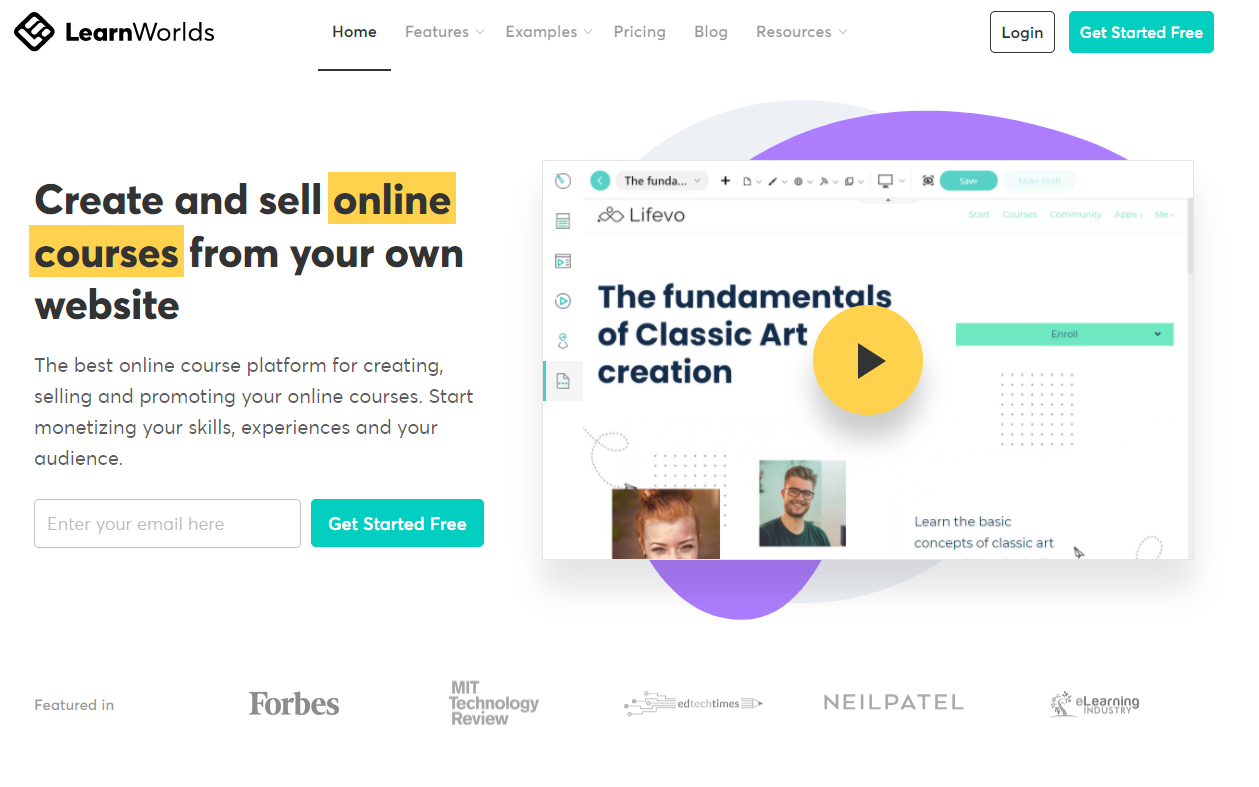
For best interactive e-learning and advanced white-labeling features, none comes even close to what you can achieve with LearnWorlds. From the ability to add interactions to slides, ebooks and videos to multiple types and formats of quizzes, tests, assignments and exams – whatever course outline you can dream, you can build.
Key Features
- Interactive elements to ebooks, slides and videos to improve learner engagement
- A wide variety of assessments, tests and exams are available to assess students
- Robust in-built community features for improved student engagement
- New and improved website editor with ready-made and fully customizable templates
- Advanced white-labeling features to make it your every own
Limitations
- While still easy to use, it’s not as easy as other platforms
- No advanced gamification features
- Limited drip/broadcast email features
- No free plan
Pricing
LearnWorlds is the cheapest of the three platforms and offers three paid tiers starting at $29/month with a 30-day trial on offer. This entry-level plan, however, comes with a fixed charge of $5 off every course sale.
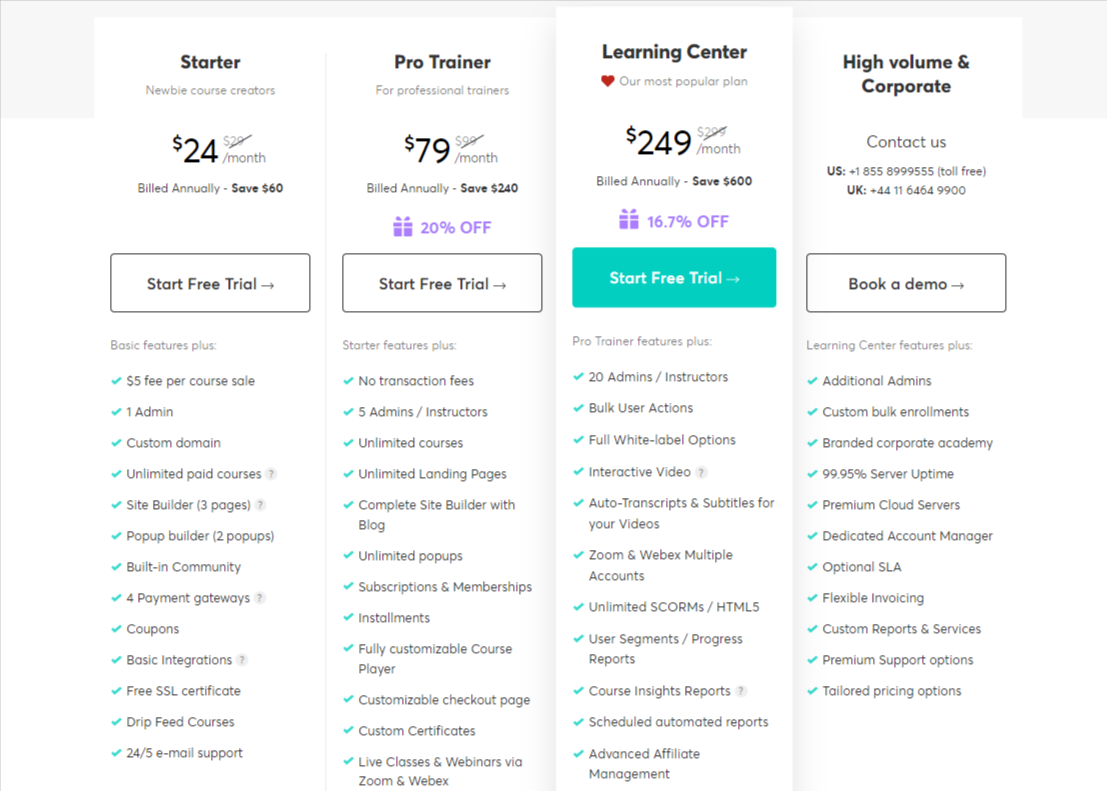
With this plan, you can connect your own domain or a sub-domain to your existing website. Built-in community and unlimited courses and students are also available in this plan.
Their next plan starts at $99/month, and you get additional premium features such as course certifications, memberships, subscriptions, live zoom classes, zapier integration and many more.
All their plans offer 20% off when you pay annually and you can free trial even their most expensive plan at $299/month.
Who Uses LearnWorlds?
- Schools: To create the best online learning experience for kids and adults alike, you’ll need a platform that closely mimics the in-person classroom experience, and LearnWorlds gives you the tools to do just that.
- Professional Educators: Beyond the ability to give your students the best online learning experience, LearnWorlds gives you the ability to test and assess their learning through graded or ungraded, formal or informal, close or open type questionnaires.
- Medium businesses/Corporations: Maybe you’re looking for an in-house training program for your employees with the ability to offer branded certifications upon completion. LearnWorlds allows you to do that too.
- Entrepreneur: Whatever kind of entrepreneur you may be, if you want to give your students the best learning experience and a greater sense of community, chances are you may find LearnWorlds to be the best platform for that.
2. Thinkific
Popular among professional course creators. Pricing starts at $49/month (billed monthly). No transaction fees.
Thinkific makes it extremely easy to create online courses while offering robust ancillary features for marketing and selling online courses.

There are a few things that set Thinkific apart from the rest beyond their easy-to-navigate intuitive drag and drop visual course builder. Thinkific app store allows you the ability to integrate and extend your course builder’s functionality beyond the out-of-the-box features that come with their paid plans.
Key Features
- Easy to use and navigate visual online course editor
- Ability to customize a lot of touchpoints for your online course
- Ability to deliver different types of courses such as cohorts, evergreen and drip content
- Advanced data analytics and reporting
Limitations
- Limited templates choice and customization
- Non-advanced video content, no quizzes and gradebook
- No one-click sales funnel
- No customizable options for student login
Pricing
Thinkific pricing starts at $49/month on monthly billing with a 20% discount when you pay annually. Unlike LearnWorlds, they have a free plan and charge no transaction fees on any plan.
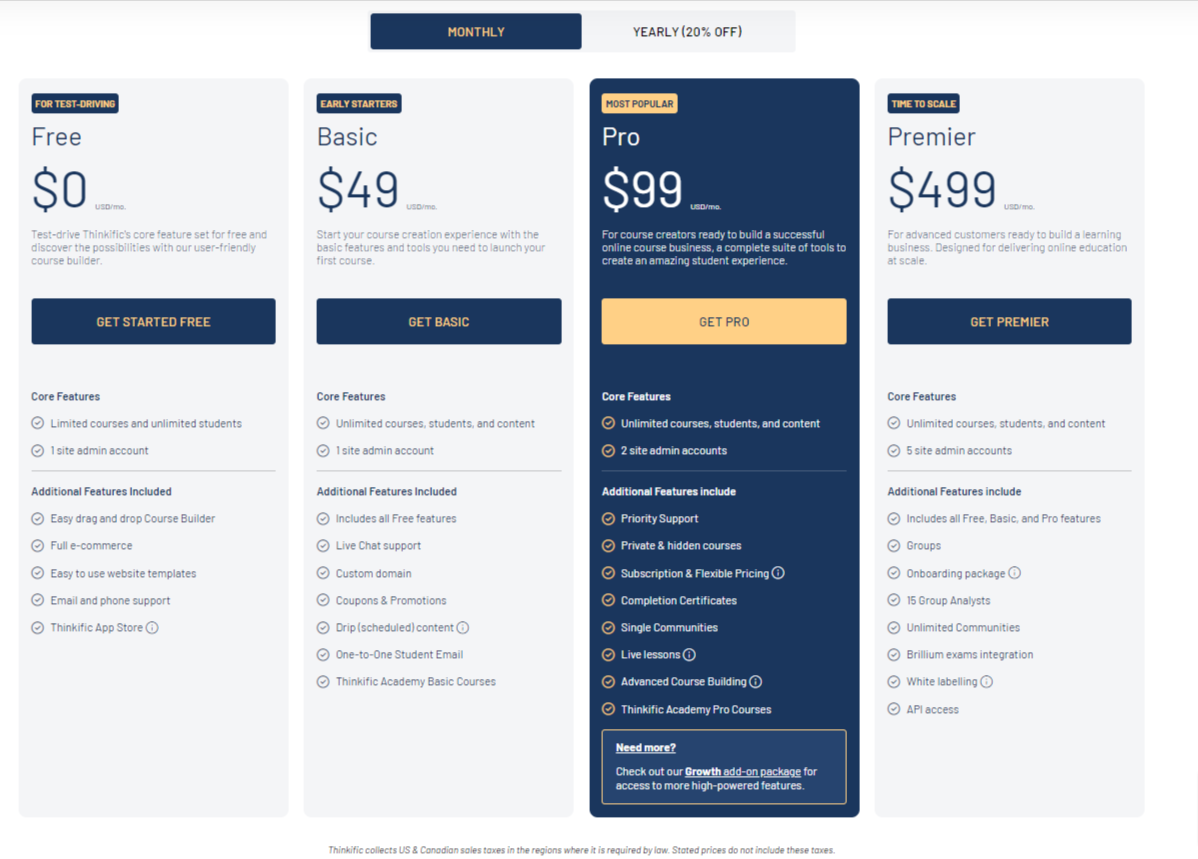
Their most popular pro plan starts at $99/month and allows you to create unlimited courses, upload unlimited content, and have unlimited students. They also have live zoom sessions, communities, completion certificates, membership and subscription pricing.
All plans have a 30-day trial.
Who Uses Thinkific?
- Bloggers & creators: If you’re looking for a simple course builder solution to create, market and sell your course or coaching program, Thinkific is a go-to online course platform for a lot of bloggers.
- Small to medium-sized businesses: Want to educate your customers on your latest product/tool and how to use it or train your employees for their professional growth, Thinkific may be the solution you’re looking for.
- Consultants, coaches, speakers & authors: While Thinkific does not have one-on-one coaching features, you can use Calendly or Doodle to schedule coaching sessions with your students. You can also create gated content reserved for your different membership levels.
3. Teachable
Popular among small-time creators & solopreneurs. Pricing starts at $39/month (billed monthly). Free plan available.
When Ankur Nagpal, founder of Teachable, started with the company, he was motivated by the desire to make it awfully easy for an average Joe to create and sell online courses hassle-free.
And true to his wish, Teachable has become a go-to platform for all kinds of creators from artists to youtubers, bakers to potters, and photographers to marketers.
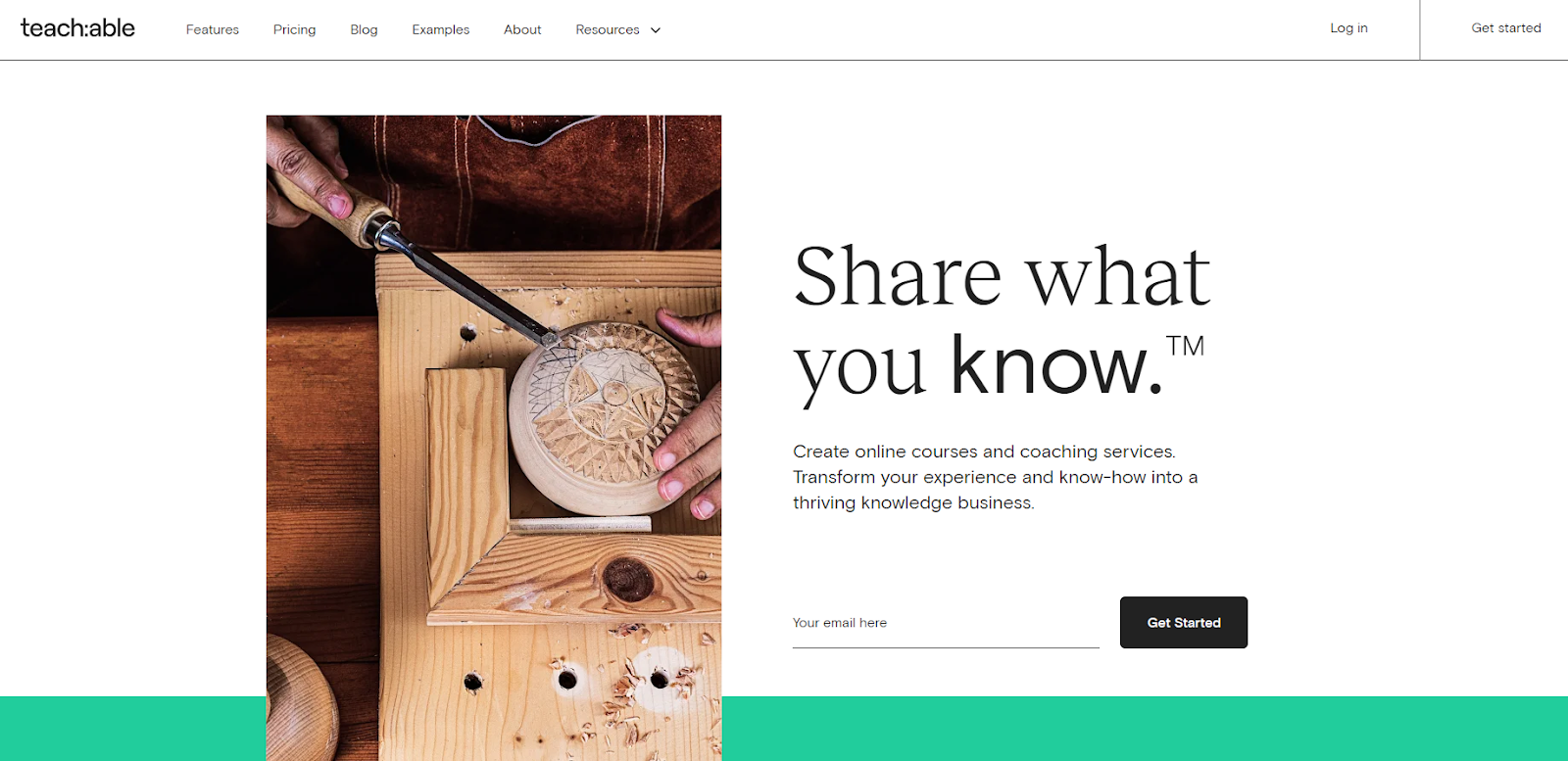
Touted as the best online course platform for small-time creators and first-timers, the truth is, Teachable is also used by big-time heavy heaters such as Shopify, The New York Times, Intuit and many others.
This reinforces the point I made earlier, and that is, understanding your needs will help you better decide on the best platform for those needs rather than “because I am a big biz, Teachable will not serve my needs”.
Key Features:
- Easy and efficient checkout process with one-click sales funnel
- Course creation and selling features are Intuitive, seamless, and easy to use
- Built-in Teachable payment processing options eliminates the need for 3rd party integrations such as PayPal and Stripe can if you wish to.
Limitations
- Membership options are limited and could be improved
- There are not as many site customization options like other platforms
- While there are some multi-language features, they’re limited and not ideal for creators that need robust language support
- Lot of course buyers complain about the refund policy, customer service and course disappearing from their dashboards.
Pricing
Teachable offers unlimited students and courses on all their paid plans which starts at $39/month for their basic plan (billed monthly). This plan includes 2 admin-level users, custom domain support, membership-only community, drip course content, and coupon codes.
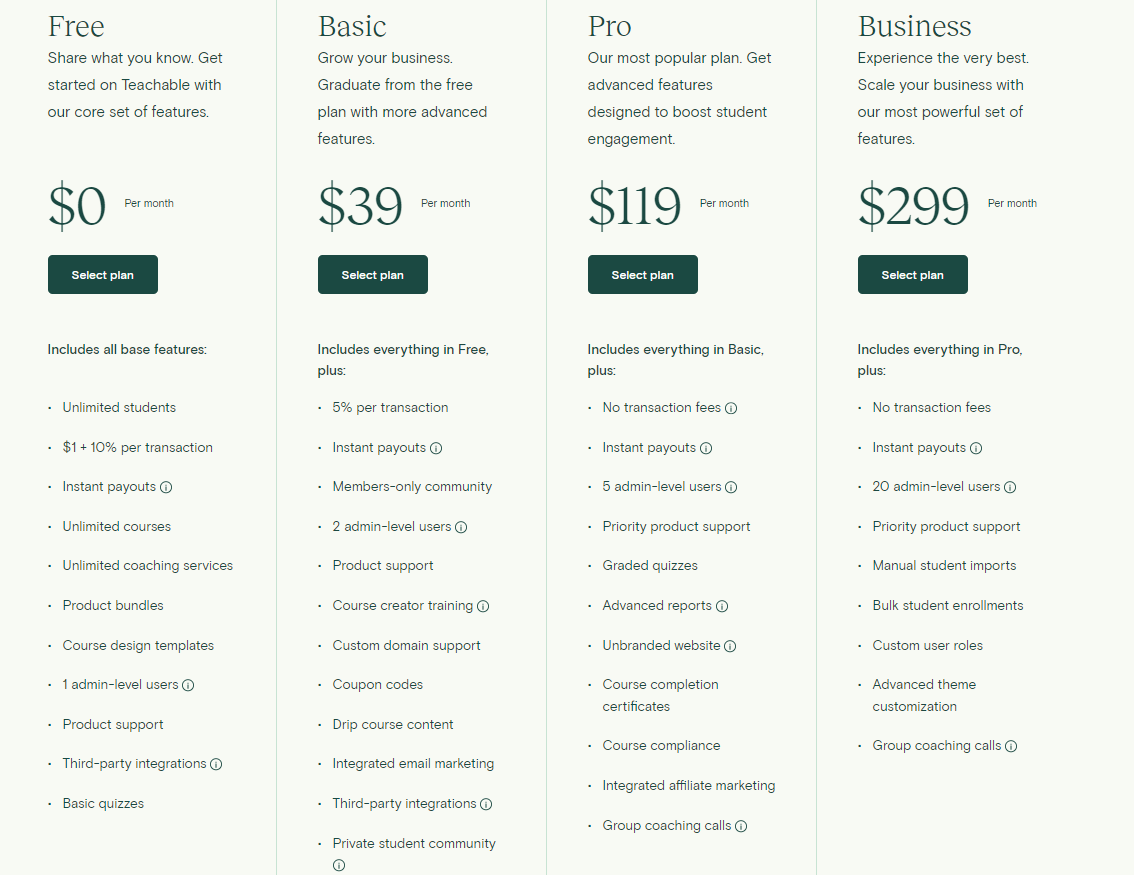
Unlike Thinkific, they do charge transaction fees of 5%, unless you’re on their pro plan or higher. Their pro plan offers, in addition to everything in Basic:
- Access to white labeling features (except on checkout and login pages and mobile app)
- Advanced reporting and analytics on course, students, videos and upsells
- Course completion certificates
- And upgraded customer support and ability to support affiliates for your courses
Wanna take Teachable on a test drive without voting with your pocket? They do offer a free plan but no free trial of their paid plans, yikes!
Who Uses LearnWorlds?
- Artists & Creators – Whether you’re a chef or a photographer, Teachable has been able to attract artists of all kinds looking to generate a side income by sharing what they do best or in some cases, make a comfortable living by sharing their craft with others.
- Marketers – If Pat Flynn can host his platforms there, chances are small-time marketers can also find Teachable to have the features they need to create, market and sell their online courses.
- Businesses – If you’re looking for a simple and streamlined course delivery platform for your business, why not join the likes of Shopify and The New York Times. Sometimes it doesn’t have to be the most sophisticated course platforms that meet your needs – it can be the simple yet robust platforms like Teachable.
Best All-In-One Platforms
All-in-one platforms, while offering many of the features that specialty platforms have, they offer additional solutions to truly bring your online businesses under one roof.
Though this is not to say they’re perfect or better than the specialty platforms in any way. Their expansive sales and marketing solutions offer more than the ability to create and sell online courses but also:
- Create live/automated email/SMS marketing campaigns to nature leads and engage customers
- Create full-fledged membership and coaching courses with built-in scheduling, opt-in forms, landing pages, and checkout tools
- Advanced automation and email sequencing based customer behavior and activity.
- Ability to create and sell additional digital products such as podcasts, ebooks, swipe files, and many more.
These platforms are great for professionals looking to bring all their web presence under the same platform. Ideally, these are folks that have tried the likes of Thinkific and Teachable but have felt quite stifled as their business grows.
4. Kajabi
Best membership and coaching courses. Pricing starts at $149/month (billed monthly). 14-day trial available. No transaction fees.
If you’d like to put all your web presence (courses, website, podcast, email marketing, webinars) under one roof on near autopilot, that platform would most likely be Kajabi.
With Kajabi you can create entire marketing funnels from your landing pages, opt-ins, checkout and course pages.
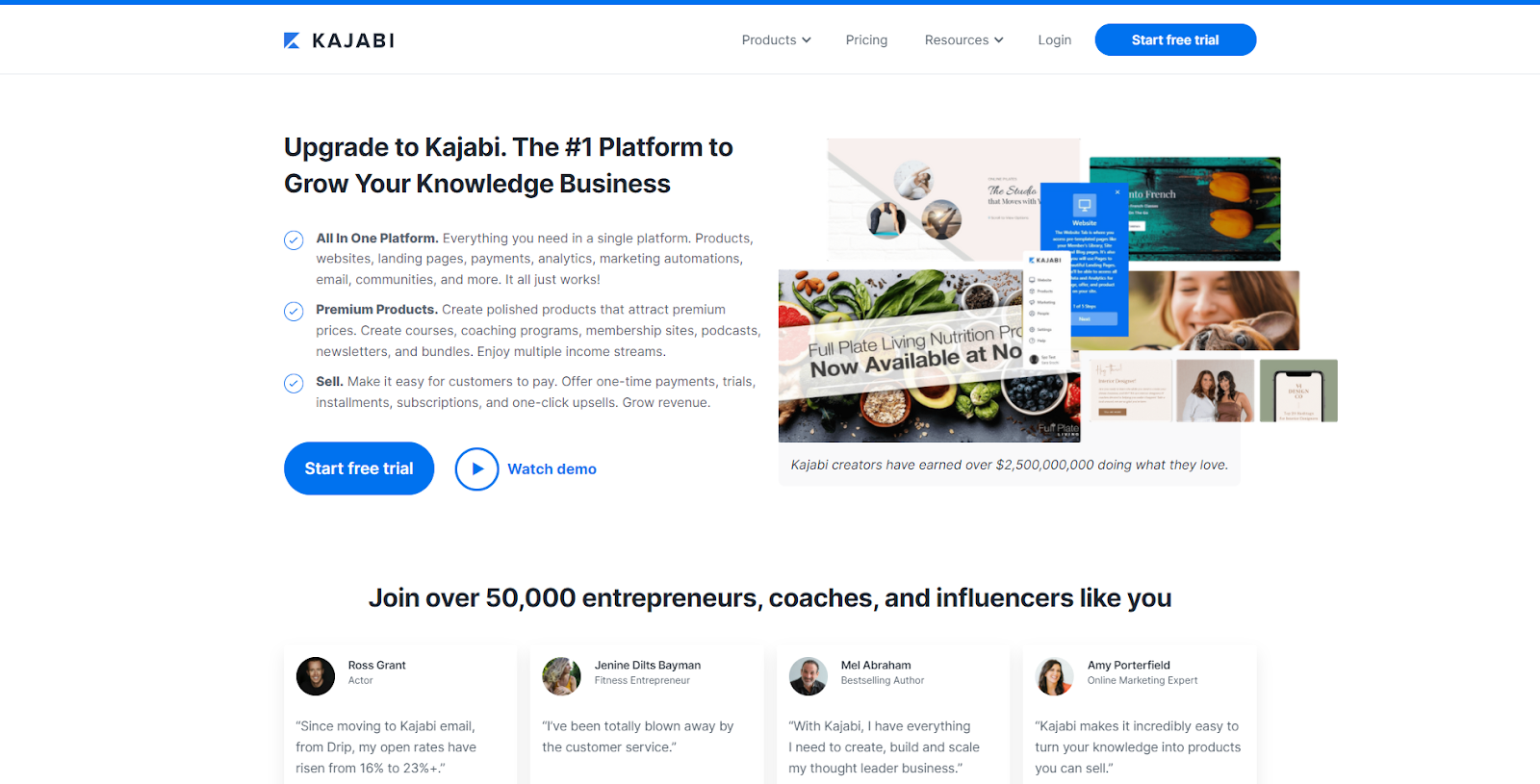
The truth is for most people who are either getting started with online courses or they’re just looking for a simpler solution to integrate with their existing website, Kajabi may seem like overkill. Besides, Kajabi is not cheap. Their paid plans start at $149/month.
However, if you’re a professional looking for a platform with advanced sales and marketing features, then Kajabi may be the ticket.
Key Features:
- Advanced sequencing, automation, and seamless integration of emails, landing pages, opt-in forms and checkout pages
- Create websites and pages you can easily customize to match your brand
- Engage with your students through a built-in community platform
Limitations
- Bit of a learning curve with properly being able to use all the features at your disposal
- Non-interactive videos. For example, you cannot add CTA to your videos
- No ability to split test your campaigns
- All plans have upper limits on the number of courses, customers and websites
Pricing
Unlike the platforms we’ve discussed so far, Kajabi is the only one that has a limit on the number of courses and students you can create on any particular plan.
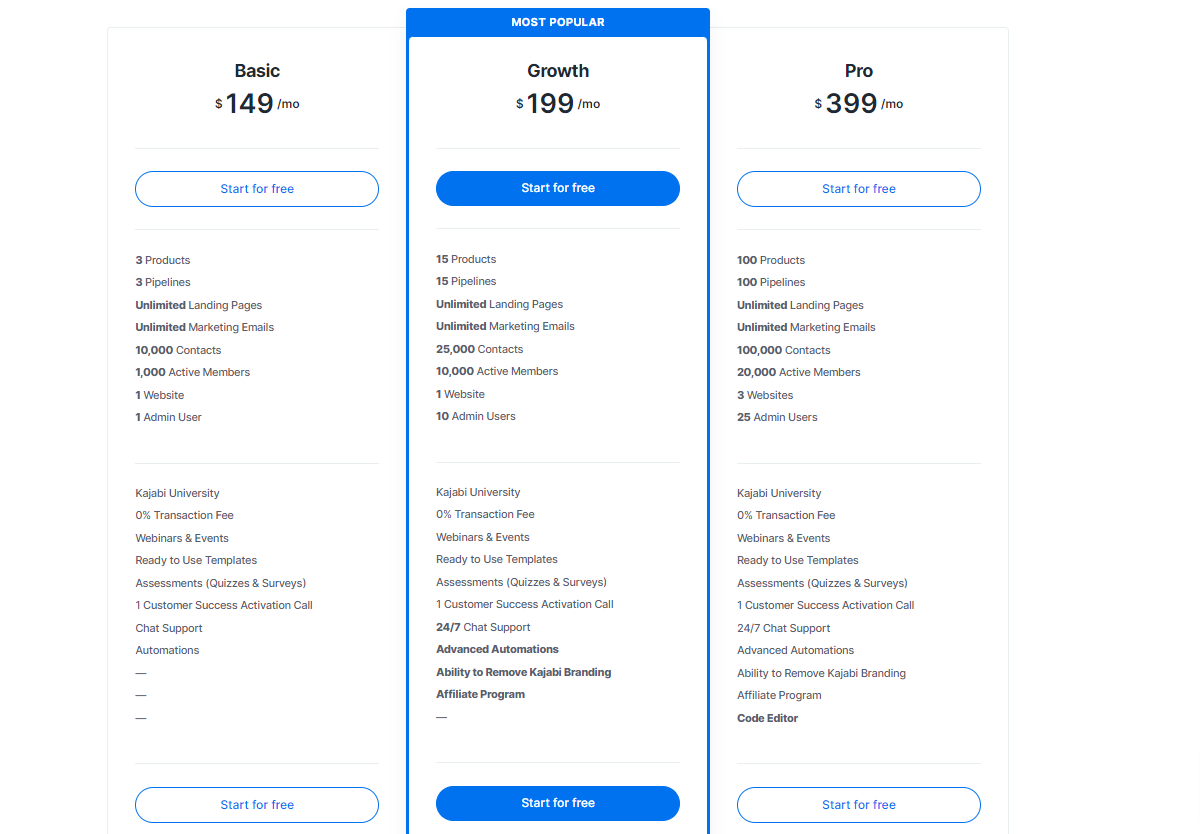
This is such as bummer, especially with their pricing point starting so high. Kajabi’s basic plan starts at $149/month which only allows you 3 products that can include any of their offerings such as a mini course, drip content, coaching, membership, or community. It’s safe to say for a lot of folks, this plan will quickly not be adequate.
It is then no wonder their most popular plan is their growth plan which starts at $200/month. At this tier, you can create up to 15 products and have up to 25 000 contacts in your list. You also get advanced automation and white-labeling with the growth plan.
Kajabi its more on the expensive side. However, for professionals with successful online businesses may seem like a bargain for all the features and tools that Kajabi offers.
5. Kartra
Best for professionals whose focus is video content. Pricing starts at $99/month. $1 14-day trial is available. No transaction fees.
Kartra’s impressive lineup of sales and marketing features no doubt make it one of the most versatile online course platforms out there.
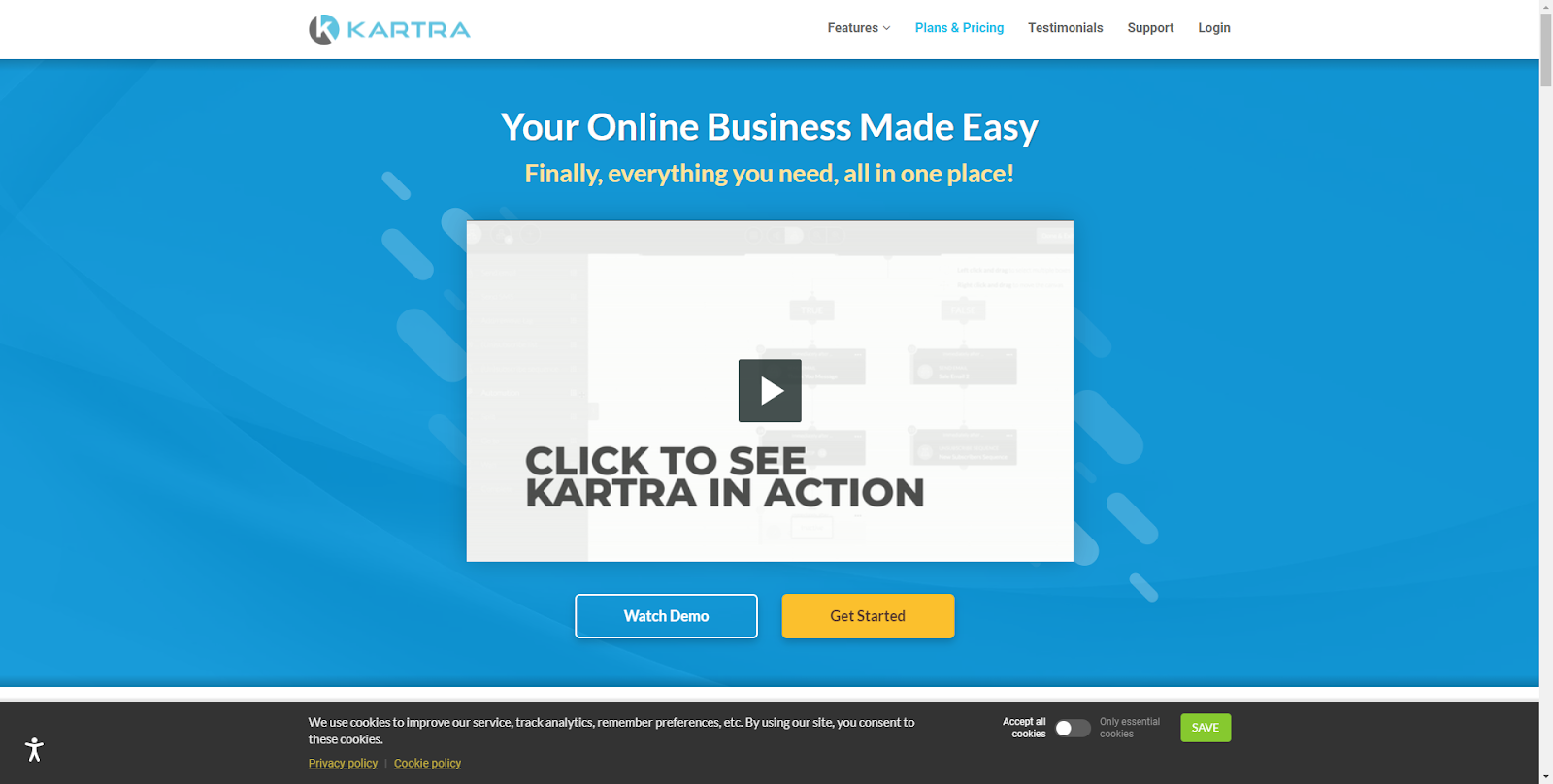
Where Kajabi lacks, Kartra comes out as a stronger alternative. And vice versa is true as well. While Kartra has many of the features that Kajabi offers, here are a few areas where Kartra has an upper hand.
These key features include:
- Video content: Kajabi offers basic video functionalities while Kartra comes with advanced in-video actions such as CTA, opt-in forms and tags based on customer behavior.
- Calendar & scheduling: While Kajabi allows for integration with Calendly, it does not have built-in calendar functionality as Kartra does.
- Split testing: Unlike Kajabi, Kartra allows you to split test different campaigns. This can mean a big difference for your marketing and sales efforts.
- Help desk: Providing fast and easy customer support is important for any business and that’s where Kartra’s help desk comes in. Here you’re able to provide immediate customer support via live chat and ticketing system rather than slow email support.
However, Kartra, like any other platform, is far from being perfect. There are some features that are either completely not supported or not as advanced as other platforms. One such area is with their learner experience features which sometimes feel like some sort of an “afterthought” rather than the basis upon which everything else was built.
Limitations:
- Limited bandwidth: Kartra puts a limit on your bandwidth on the lower plan. While 50GB bandwidth may sound to be a lot, this bandwidth includes uploading, downloading, hosting and streaming of images, files, and video assets and can quickly run out.
- Student engagement tools are limited: Kartra course builder and student engagement tools are very limited. For instance, there aren’t any assessments, quizzes, or community features available.
- No blogging feature: While Kartra website builder comes with various design options, it’s pity that they haven’t thought about the importance of a blog for a marketer.
- Sales funnels editor: Sales funnels can get complex rather quickly and it helps to be able to visualize them while building. And Kajabi does that supper well. However, Kartra leaves a lot to be desired in this area.
Pricing
Kartra offers a $1 14-day trial to take it on a test drive. Their paid plans start at $99/month (billed monthly) for their starter plan which offers everything that their most premium plan offer; the only exceptions are the upper limits of what’s on offer.
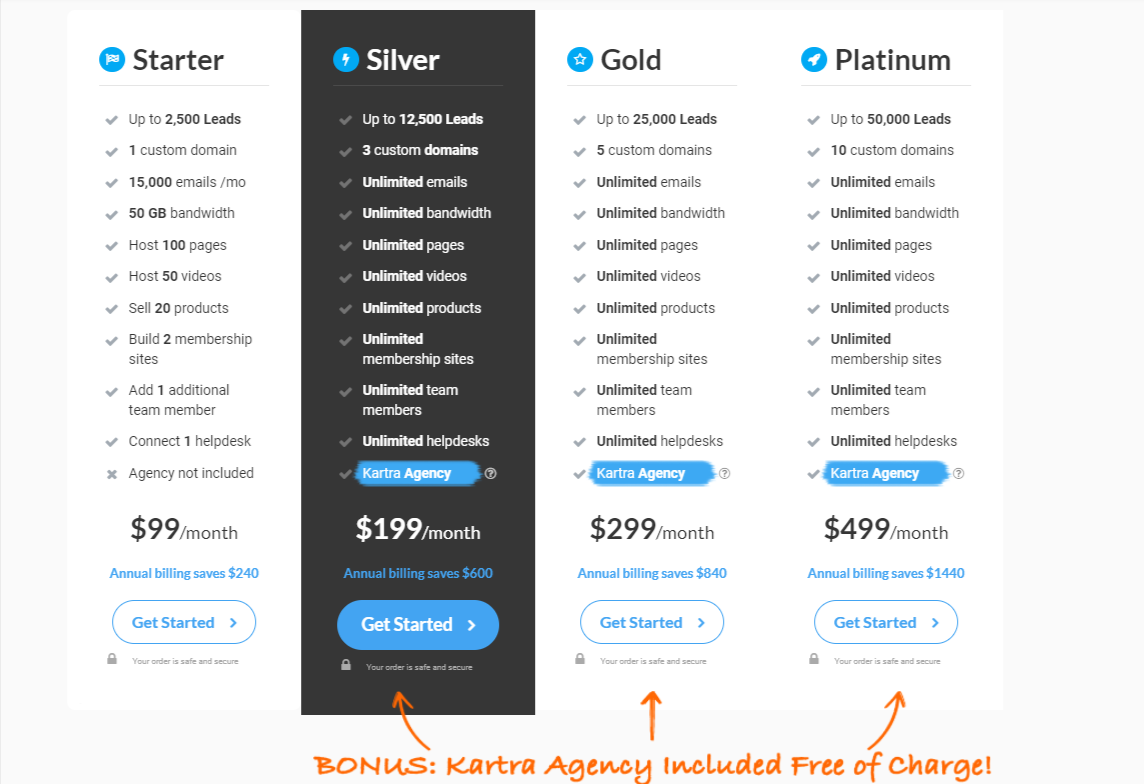
For example, with their starter plans, I mentioned earlier that they cap the bandwidth at 50GB but it becomes unlimited at higher plans. This goes for other features.
Who Uses Kartra?
Kartra is used by entrepreneurs looking beyond just sales funnels but wants to integrate all their web presence under one roof without the need for endless integration with 3rd party tools.
- Coaches and consultants: Are you’re a coach or consultant offering one-to-one sessions with your customers and are looking for a solution that will help you create your schedule, market your expertise and sell all within one platform?
- Trainers and instructors: Kartra’s calendar management tool offers the ability to book multiple registrants per class. Whether you’re a gym trainer or yoga instructor, this tool and other features can help you run your business effortlessly.
- Affiliate marketers: With Kartra funnels and campaigns you can build perfect sales funnels to capture and continue to nature your leads with their world-class email platform.
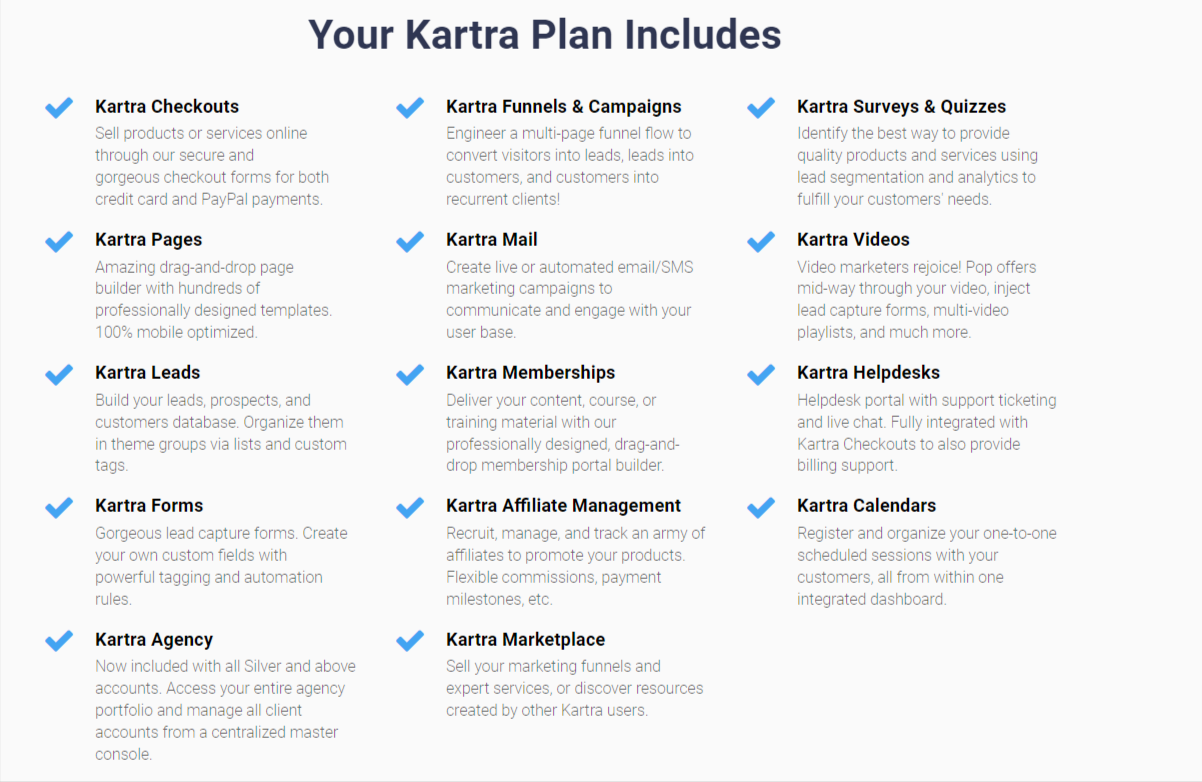
Kartra allows you to create, market, sell and manage your digital products all under one roof without ever having to integrate with a single 3rd party platform.
With its price and everything offer, Kartra certainly provides the biggest value for your buck. For first-time users, only with time you can fully unlock its potential because of the sheer depth of its features.
So, give yourself time to discover all the nooks and crooks of this powerful tool but in the meantime, go ahead and start your 14-day $1 free trial here.
6. Podia
Best for selling digital downloads and memberships. Pricing starts at $39/month. $1 14-day trial is available. No transaction fees.
If you want the full might of all-in-one platforms but at a fraction of a price? Podia might just be the ticket. Compared to other all-in-one platforms, Podia is 60% cheaper than Kartra and 74% cheaper than Kajabi while arguably standing shoulder to shoulder with both of them in terms of features.
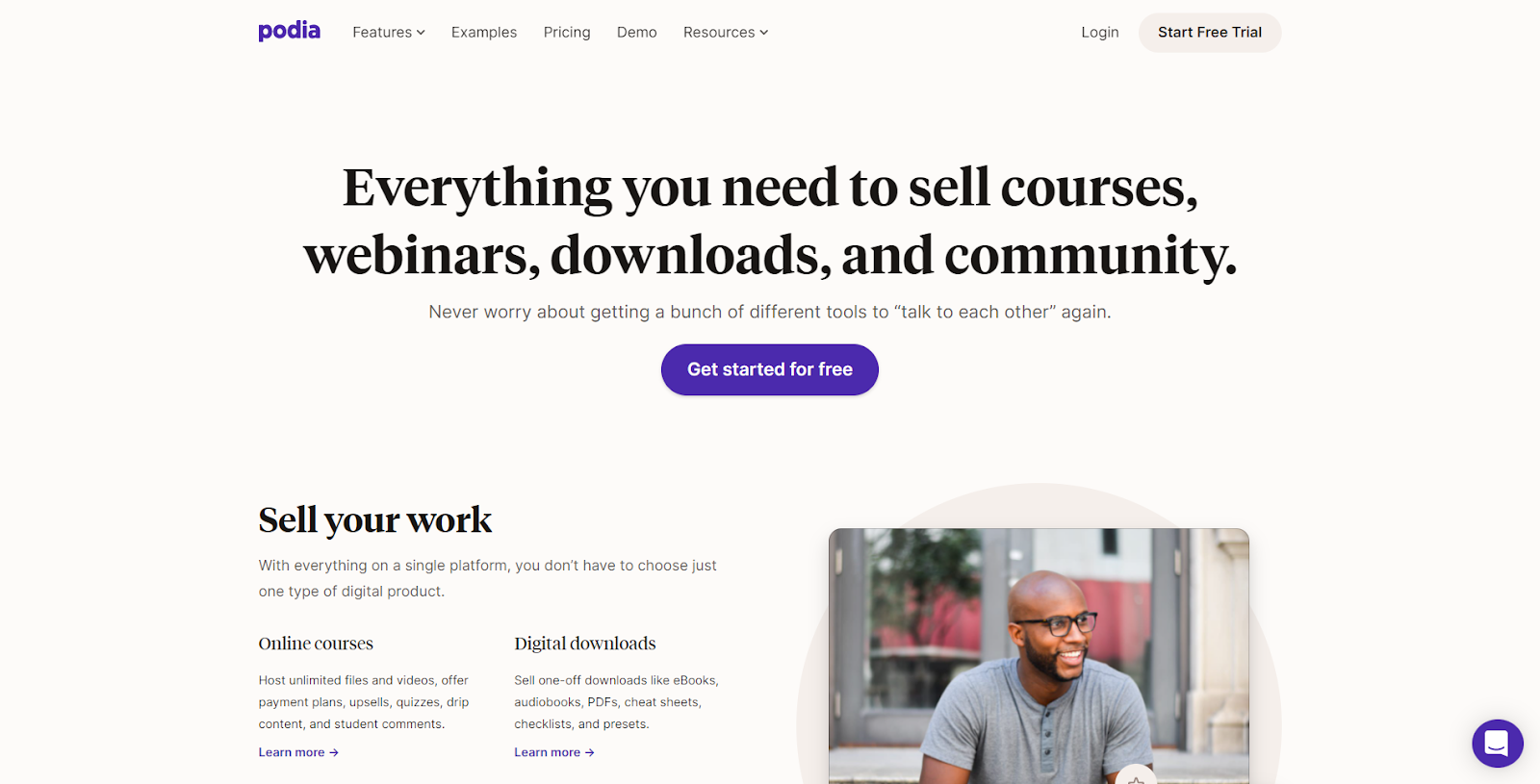
Not only is Podia creator-friendly in terms of intuitiveness and ease of use but it’s also known for its creator-friendly policies such as instant payout from sales with no transaction fees and unlimited everything.
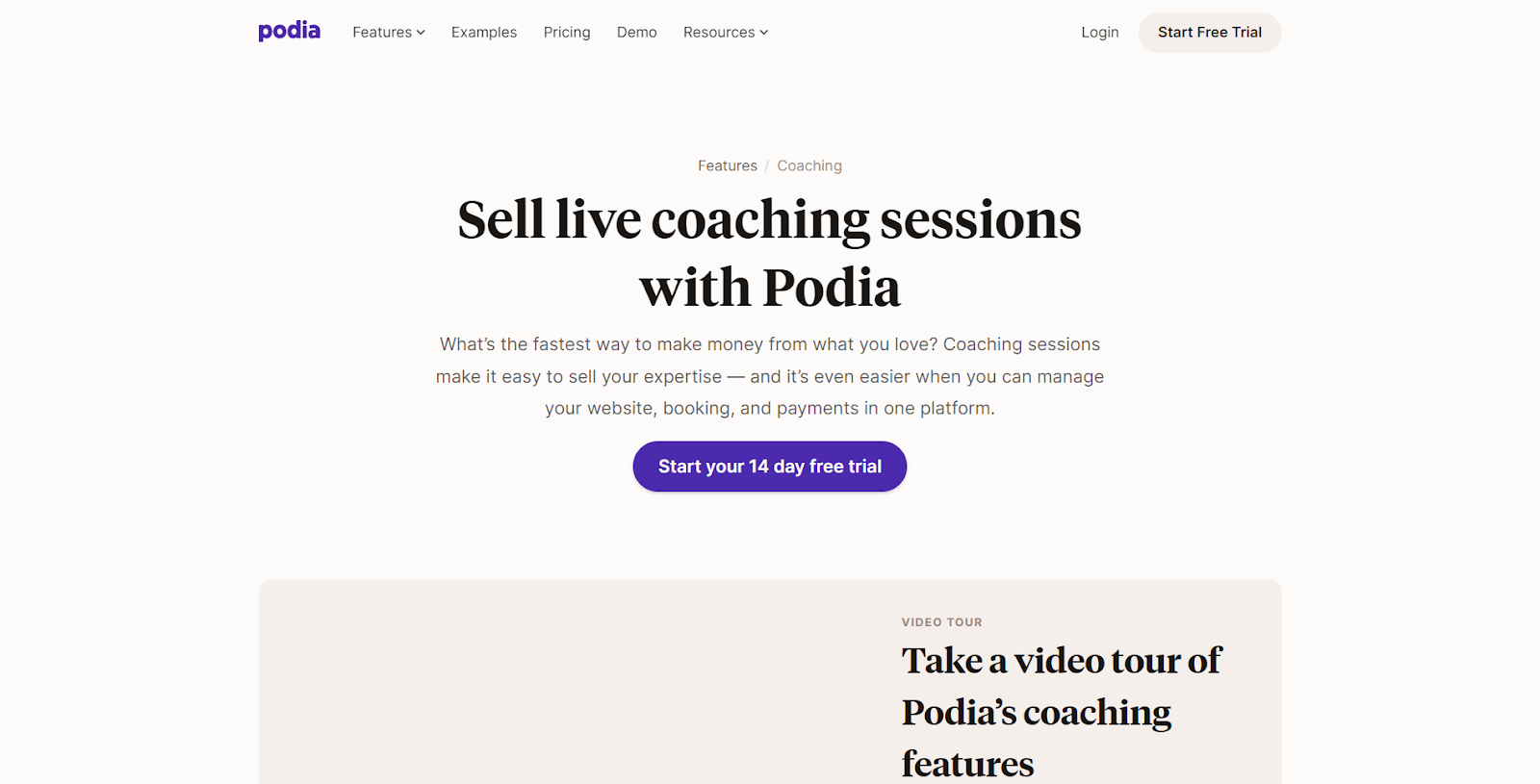
Podia was initially created for coaches but has since pivoted to a full-featured online course platform and it suffices to say it has since positioned itself as one of the strongest contenders. Podia has not only managed to keep their platform fresh and updated, but they also keep new and awesome features rolling month in and month out.
Key Features:
- Their new site editor is continually getting new features that strike a good balance between ease of use and customizability.
- Unlike Kartra and Kajabi, Podia does not impose any limit on anything – courses, students, bandwidth, sales, clients – you name it!
- Podia is up to 4X cheaper than some of its competitors in the same class such as Kajabi and Kartra
Limitations:
- The benefit of ease-of-use comes at a price of somewhat lack of total control
- Lack of open-ended question support for course creation
- Basic landing page and funnels features
Pricing
As I had mentioned before, Podia is by far the cheapest all-in-one platform amongst the ones we’ve discussed in this article.
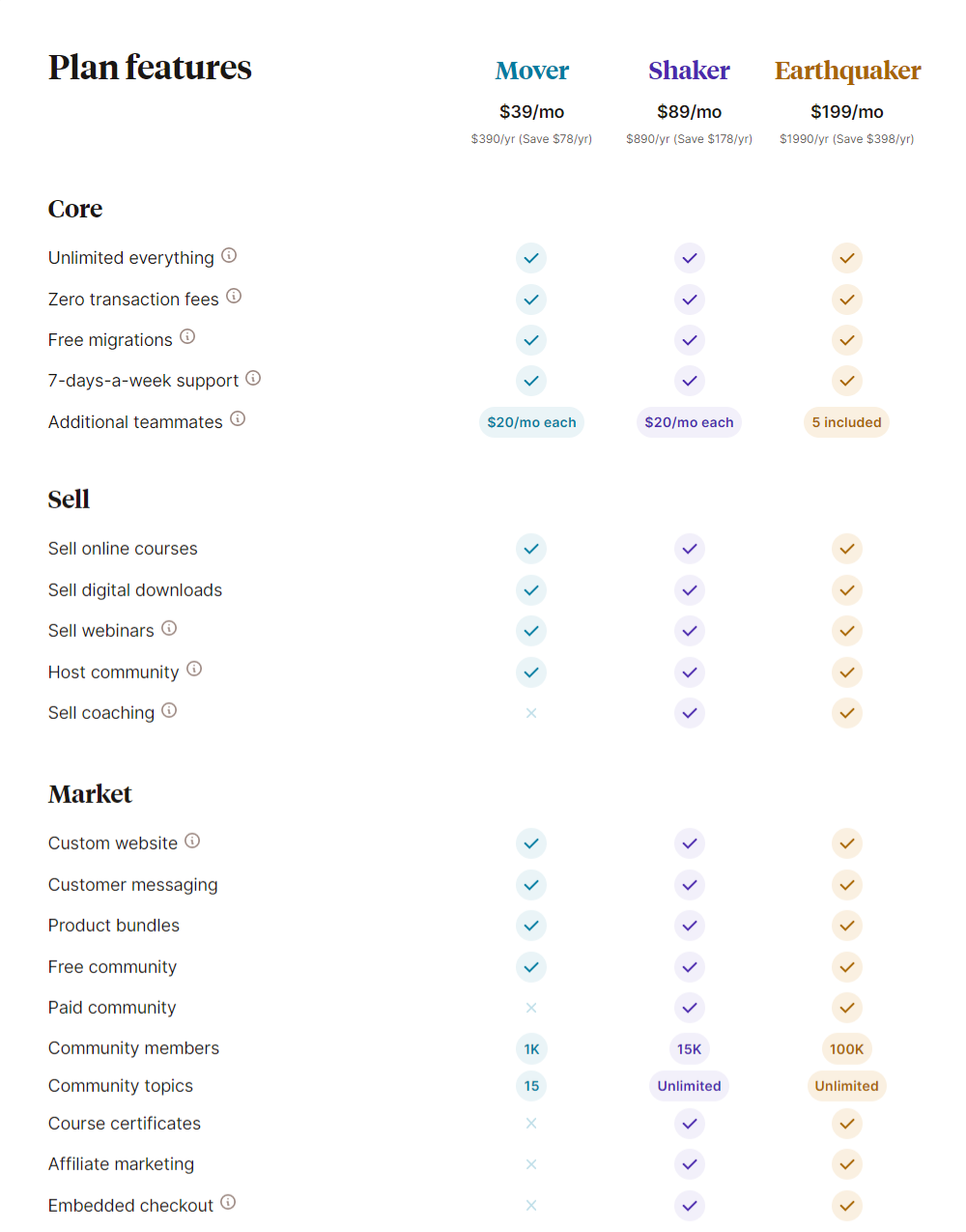
Their creator-first approach to pricing is part of what sets them apart from the rest. With any of their plans, you create unlimited courses and have unlimited students to name a few.
First, you have their mover plan which starts at $39/month which is everything else that Podia has to offer except certifications, community, affiliate marketing, coaching, and white labeling.
The shaker plan is one tier up from the mover plan at $79/month and includes everything else that’s in their most premium plan (the earthquaker plan at $299/month) except a few mostly customer support extras.
Podia also offers free content and customer migration when you choose any of their annual plans. Wanna take on a test drive before committing? You can use their 14-day, no credit card, trial on offer.
Who Uses Podia?
Podia’s main target is for non-techies and anyone else who likes to fiddle with code and assume total control with the layout and design may feel a little stifled. However, Podia continues to improve their editor with new features and perhaps they will soon accommodate developers and design techies.
If the thought of bandwidth, HTML, CSS, and what-not, gives you a headache, then know that Podia is designed with the likes of you in mind. Podia will simply help you organize your existing content in the simplest and no-techie way possible.
LMS WordPress Plugin Platforms
If you’re an existing WordPress user, as you know, you can create and deliver content with CMS platforms like WordPress. However, to deliver content (and courses) that are dynamic rather than static, you’ll need a learning management system (LMS) plugin that integrates with WordPress.
And of course, there is no shortage of LMS plugins that can do the job. How well? I hate to say it depends but it does depends on:
- What kind of digital products will you be selling? Courses, membership, coaching, etc.
- What sales and marketing features are important to you? Bundles, shopping cart, subscriptions, bulk access, etc.
- What additional 3rd-party tools would you like your platform to harmonize with? PayPal, Stripe, Mailchimp, Zapier, etc.
- What about student evaluations and assessments, do you need to be able to give assignments and award certifications?
While some of the platforms we’ve discussed up this point can integrate with WordPress (Thinkific and LearnWorlds do that well), these online course creation platforms were built especially for the WordPress ecosystem and you may be better off keeping your online businesses within the WordPress ecosystem.
7. LearnDash
With LearnDash is not only about creating online courses. But also providing immersive learning experiences with advanced quizzes and assessments and gamification features where you can reward your students with badges, points and certifications.
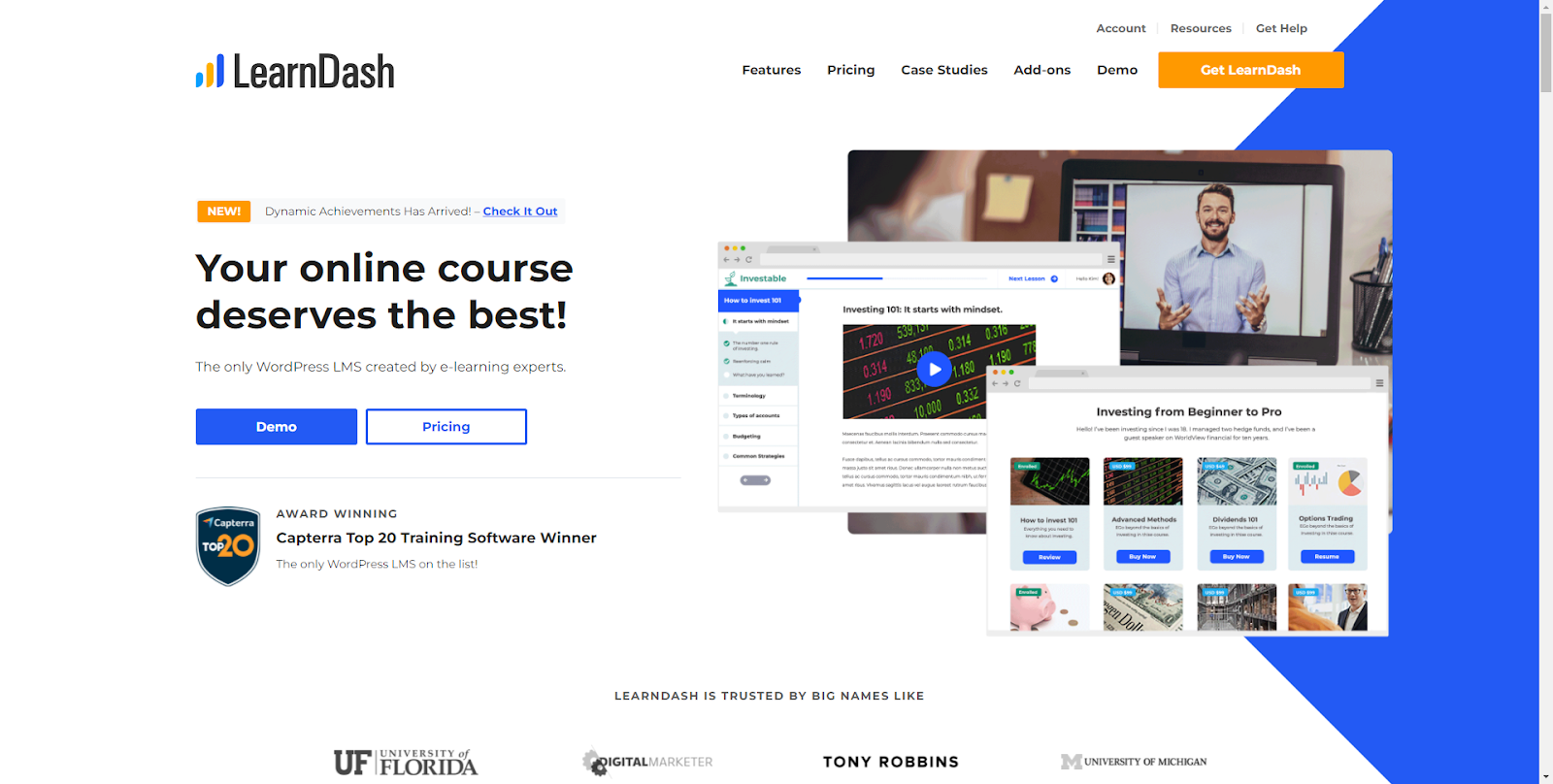
One of the first questions you’ll have to answer when creating your online course is the type of content delivery in which will present your lessons. LearnDash allows you to offer more than just static courses, but the ability to “dose” your content based on a set pre-requisite.
Wish to award points or badges to your students as they progress through the course? What about setting a time limit lesson or topic or a whole course? LearnDash allows you to do this and a lot more!
Key Features:
- LearnDash gradebook add-on allows you to customize the grading scale, manually administer grades, automatically create weighted averages and then share reports on the front end.
- Supports a wide variety of content types (images, documents, audio and video)
- A drag and drop course builder that allow you to organize and rearrange your course structure
- LearnDash’s dynamic forum that allows peer-to-peer interaction to enhance their learning experience.
Limitations:
- Needs 3rd party integration for membership features
- No built-in order bumps and upsells, will need third-party plugins
- Bulk course licensing for large teams is only possible with a plugin
- To total customization of every touchpoint, you’d have to hire a developer
Pricing
LearnDash’s pricing is very compact. That is, their pricing plans have essentially the same features, the only difference is the number of site licenses with each plan.
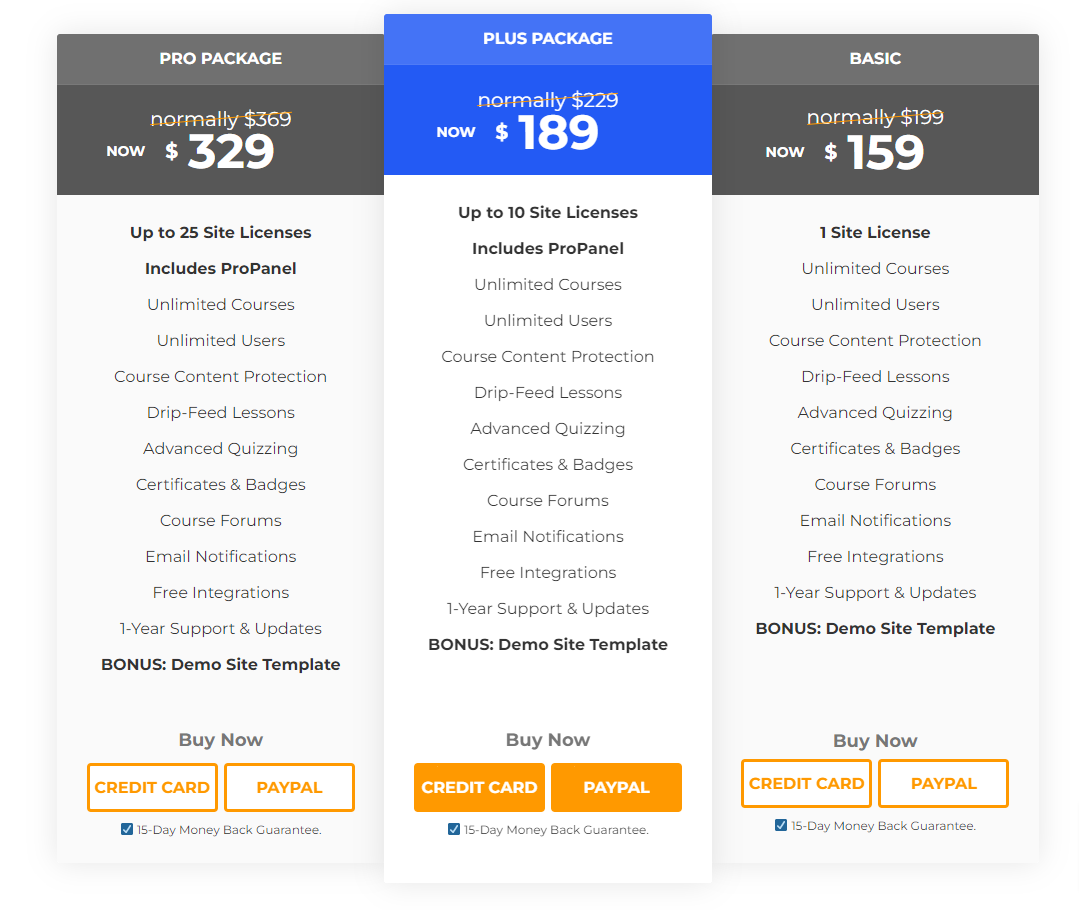
Oh, and also the basic plan doesn’t come with ProPanel which enhances your LearnDash admin experience by consolidating reporting and assignment management.
Beyond high-level metrics you can track such as total students, number of courses, and assignments pending, ProPanel also allows you to track learner progress for a particular course, real-time user activity and advanced filters to dig into your course and user data.
8. LifterLMS
LifterLMS is another flexible WordPress LMS for creating an online learning website. If you want to add a complete learning solution to your website or client’s websites, whether you’re a do-it-yourself creator or WordPress developer, LifterLMS has all tools to get you started.
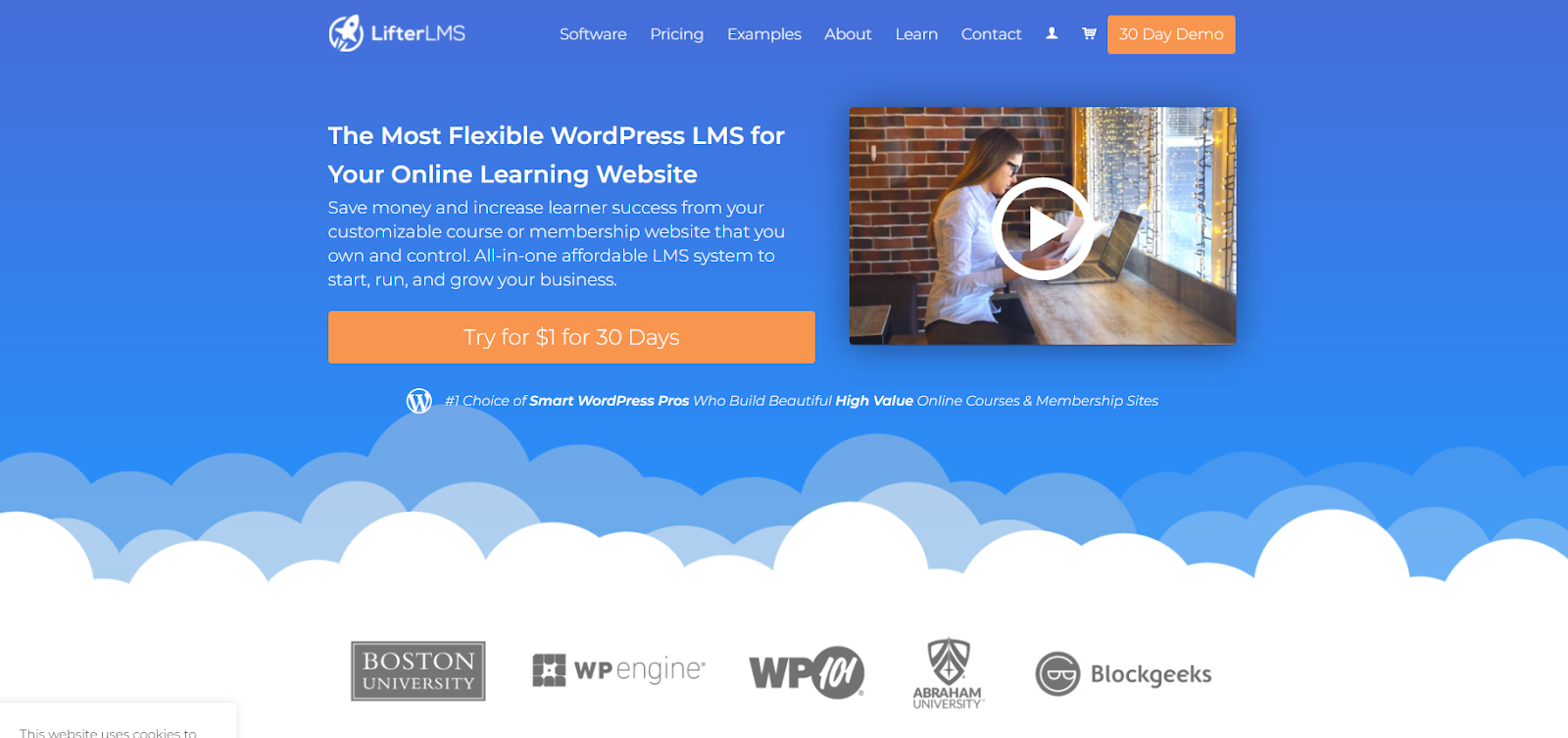
LifterLMS comes in different add-ons, starting off with a free Core LifterLMS plugin that offers all the core online course selling features.
To unlock more features, their add-ons for different functions start at $120/year. Some of these add-ons include:
- Groups: Allows you add memberships with additional group management features.
- Advanced quizzes: Their free Core plugin comes with basic quizzes and assessments. To unlock the power of interactive and dynamic quizzes, you’d have to buy this add-on.
- Social learning: Add the features that allow your students to interact and engage with each other.
- And many other add-ons…
As you can probably tell, the cost of all these add-ons can quickly add up. Though there is an option to bundle them together and save. You can either choose from the Universe bundle which starts at $360/year and comes with several add-ons. And there is also an Infinity bundle starting at $1200/year and unlocks all the add-ons.
Key Features:
- Ability to offer free courses, or bundle multiple courses together or even offer a free trial for a premium course
- Ability to sell your courses in bulk to a business, school or institution with their voucher system
- Multi-currency and country support
- Multiple pricing models and payment plans including once-off and recurring payment
Limitations:
- For some basic features (like quizzes and social) you’ll need multiple add-ons which can increase the cost
- No cross-selling dashboards with 1-click upsells
- No cart abandonment automation emails
Pricing
While LifterLMS does not offer a free trial, however, they do offer their Core LMS plugin for free. Plus, you can try any of their premium add-ons for a 30-day $1 trial.
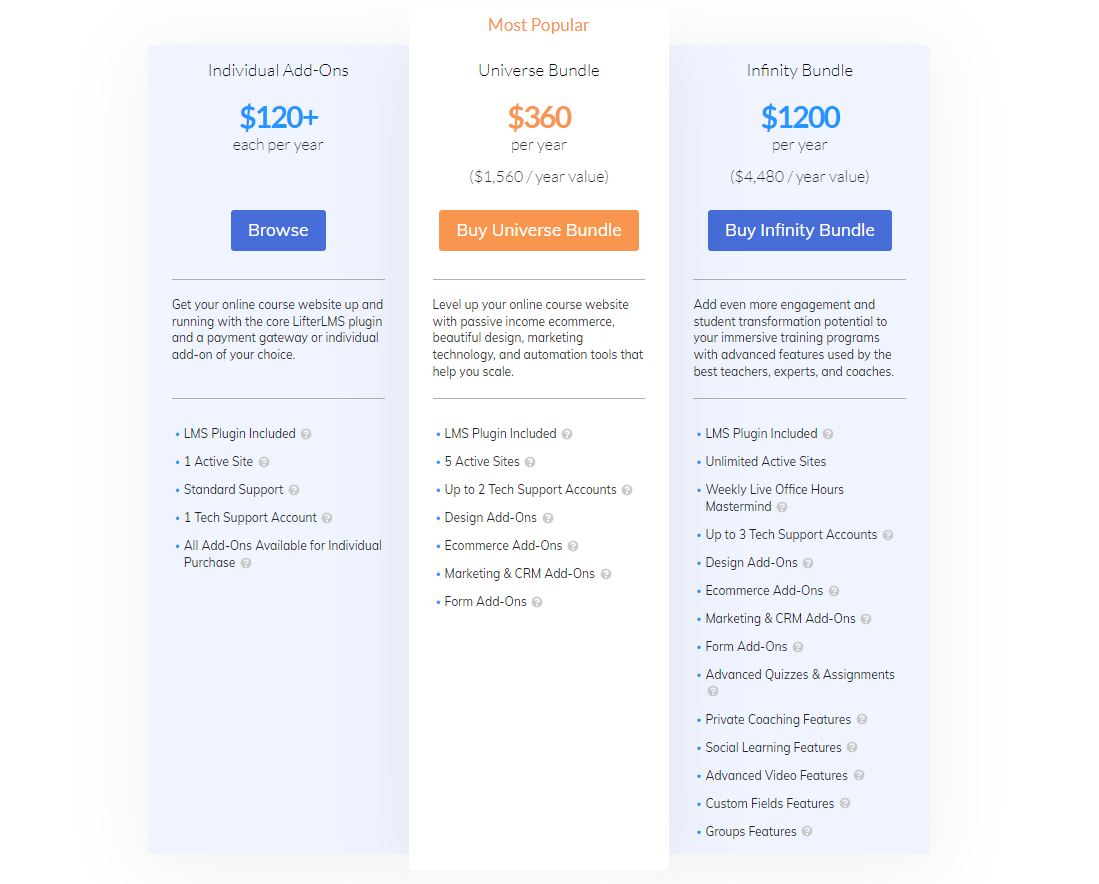
Their most popular bundle, Universe bundle, comes with 11 of 20+ core add-ons and features for up to 5 own course websites. At $360/year these features may get you to create a solid course delivery platform, however may not be enough for growing and scaling your business.
For additional features, you have two choices – you can either buy individual bundles such as quizzes, email marketing, certifications, social learning, etc. at $120 pop or you can upgrade to the most premium bundle, the Infinity Bundle at $1200 per year.
Who Uses LifterLMS
- Schools & learning centers: If your school’s website is already built on WordPress and you’re looking for a solution that builds on what you already have, LifterLMS Infinity Bundle gives you all the tools to engage your students and manage your course platform.
- Business & Corporations: Employee training (orientation, onboarding, compliance, etc) requires a specialized set of features to be successful. This can include features as bulk content access, content gamification, multiple instructors, etc.
- Authors & coaches: Gated content, various payment plans and private coaching upsells can make difference for your coaching business and LifterLMS has the whole suite of add-ons to grow your coaching business.
9. AccessAlly
Whether you’re a seasoned edupreneur or are just starting with online courses, AccessAlly is arguably the most robust WordPress LMS (and membership) plugin you’ll ever come across.
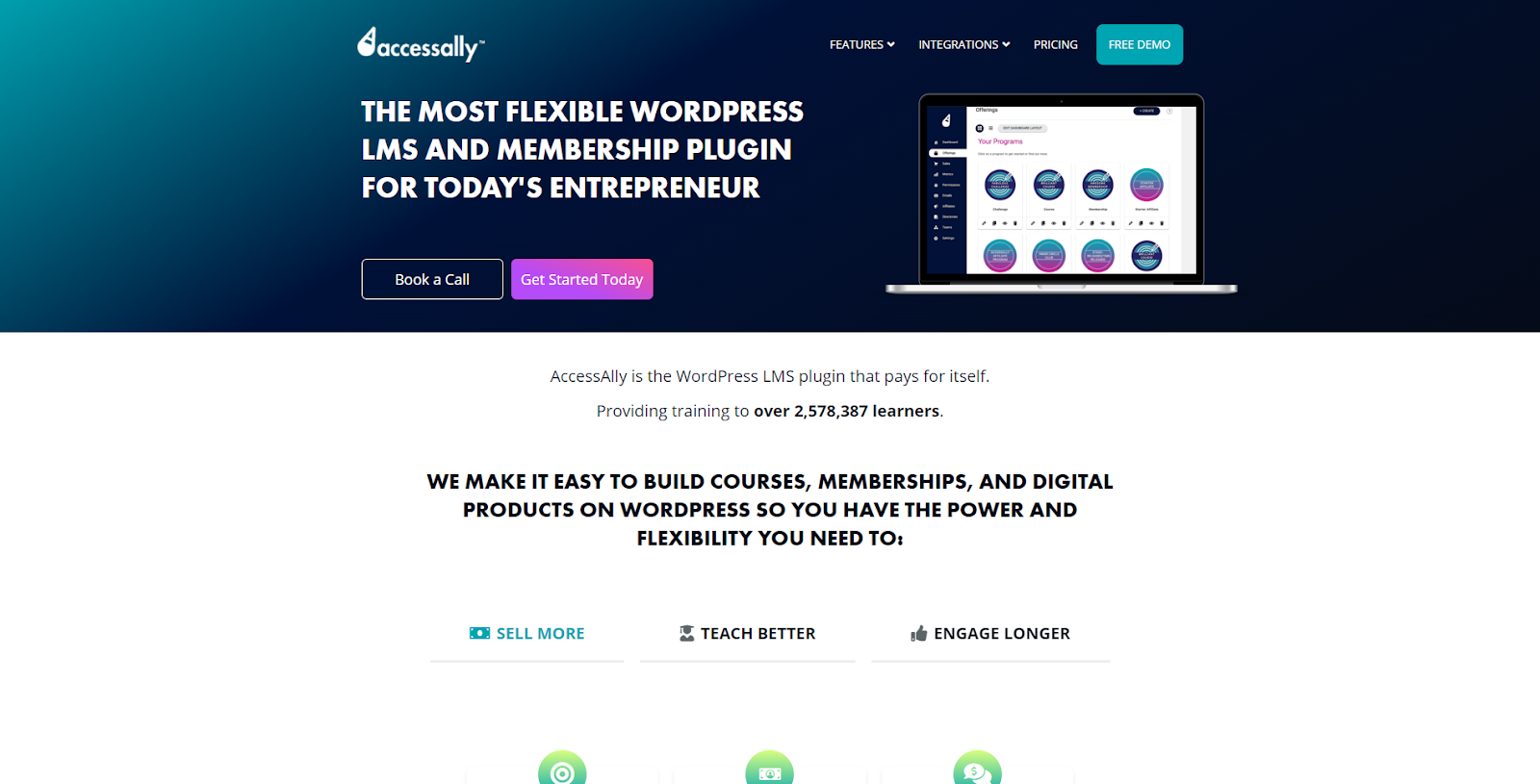
No matter where you may be in your journey, creating online courses is only the. There is a whole host of other sales and marketing factors you’d have to consider to be a successful entrepreneur. AccessAlly understands that really well.
I don’t hesitate to say AccessAlly is the most flexible and agile LMS and membership plugin amongst its peers. Considering how much some of its competitors like Thinkific and Kajabi cost, AccessAlly is extremely reasonable with their pricing which starts at $82 per month for their Essentials plan and $108/month for their Pro plan.
Key Features:
- Integrates with any theme and comes with a wide range of design customization
- Deep 2-way integration with CRM and email marketing tools
- Powerful membership management like no other
- Built-in marketing and promotional tools such as shopping cart, one-click upsells, coupons and course bundles
Who Uses AccessAlly
If you’re looking for an LMS and own private membership site plugin that:
- Makes everything to work seamlessly from one end to the other (payments, courses, and memberships) with as few plugins as possible
- Memberships are the most important part of your business and you need a solution that offers ultimate flexibility when it comes to the structure and design of your membership site
- Looking for a LMS system that can pivot, grow and scale with your business without ever-increasing costs
Marketplaces Platforms
The business model for these platforms, also known as online learning platforms, are different to other course platforms we’ve discussed so far. These platforms are learner-facing and have millions of courses (many of them free) and learners on their platforms.
While the existing online course marketplace offers plenty of opportunity for exposure and growth, because of its structure you may have to relinquish flexibility and freedom in terms of pricing, user data, marketing.
For first-time creators, this may not big a big deal, especially considering how easy it is to get started and how quickly you get get your first sale.
So, what are some of the best online learning platforms for creators?
10. Udemy
Best for first-time creators with no existing audience. It’s free to apply but you have to be approved first.
Creating an online course with Udemy is fairly easy. Once you’re approved, Udemy guides you step by step on how to upload your content and add quizzes, assignments, coding exercises, and discussion prompts.
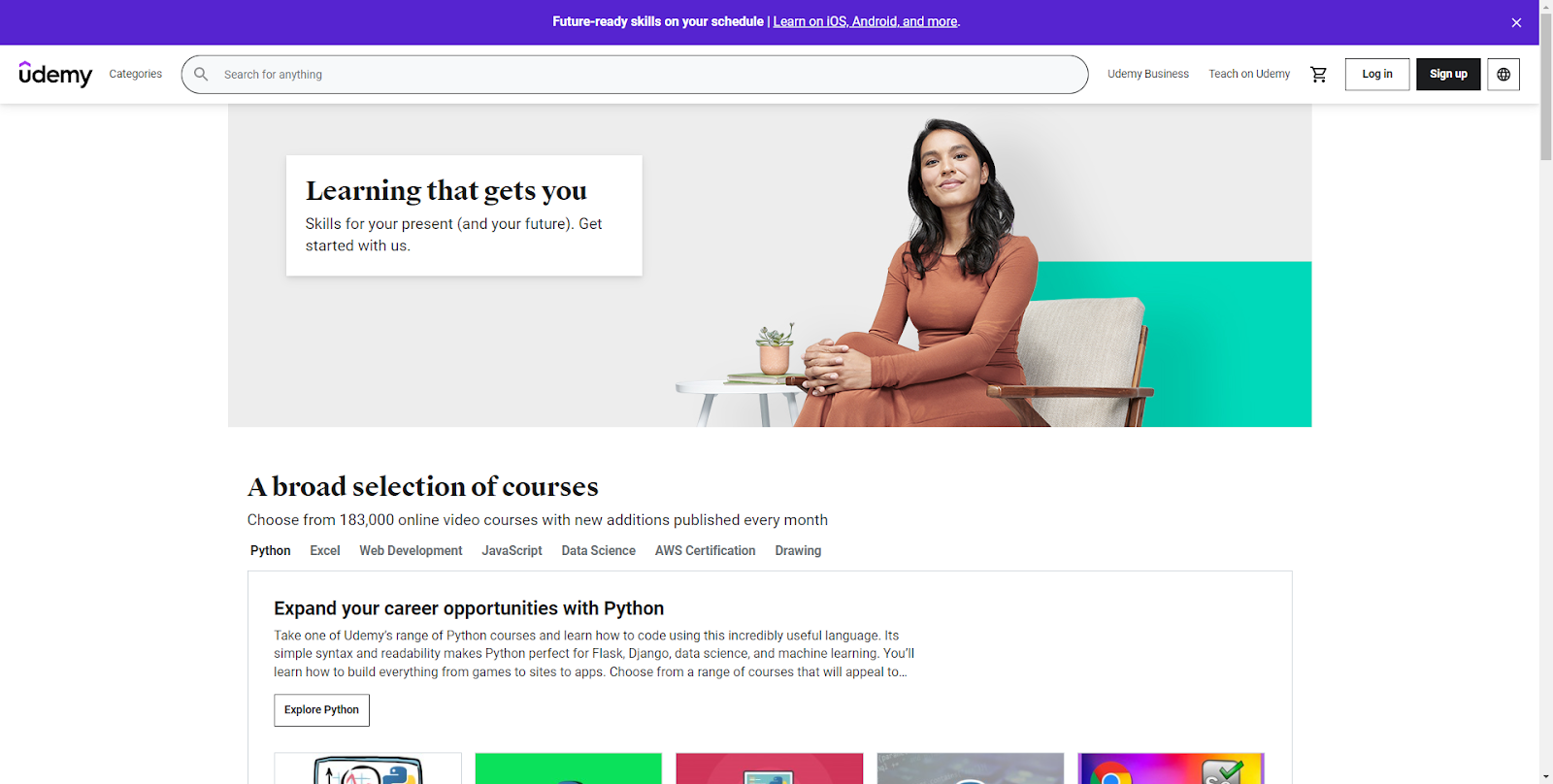
Why is Udemy the best online learning platform for beginners? Because of the level of support they offer with creating and marketing your course. Their knowledge base has plenty of tips and resources to guide you along the way. You can even submit a snippet of your lessons for review and get professional feedback on what you can improve on.
The best part? Udemy will also help you make your first sale if you hit a snag along the way. But that comes at a cost. Their fee structure looks this way:
- If the sale occurs through your own promotions you keep 97% of the revenue. This can include course sales you make through coupons or referral links.
- Udemy keeps 63% if the sale is made through their marketplace or their own promotions
What about pricing your courses? You have leeway with pricing, as long as your prices are between $20 and $200.
Best for teaching creative skills
If you’re looking to teach your craft for the first time online, Skillshare is great for that. With Skillshare you can take advantage of their massive audience of over 2 million strong.
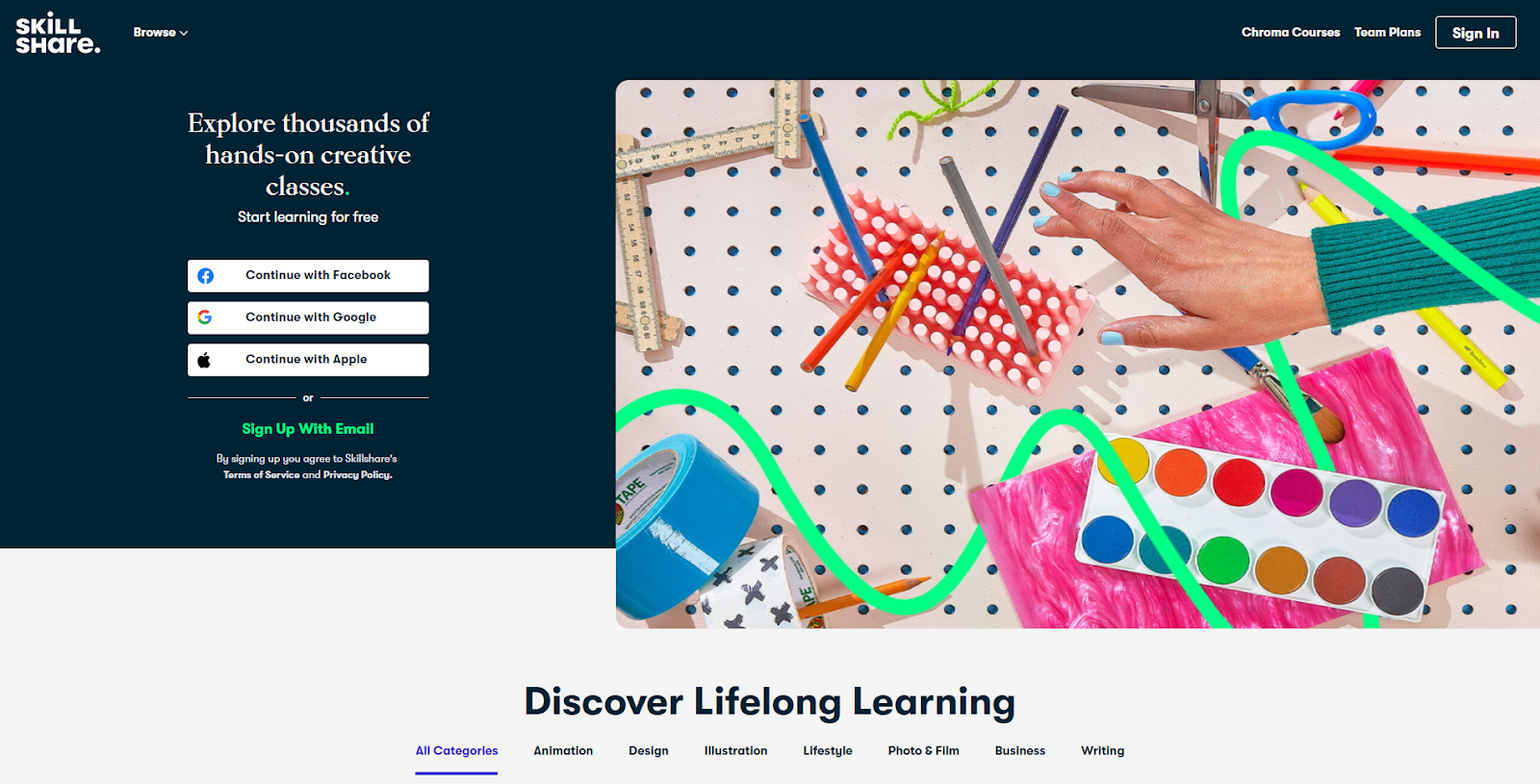
Skillshare offers membership plans to their students for access to 40 000+ premium courses. As a teacher, you get paid royalties for each minute watched in a premium class each month. Plus, you also get paid $10 for each referral that signs up with Skillshare.
Their learning experience is crafted to help your learners learn by doing rather than watching and reading. For instance, a social media class project might require students to promote their Instagram account, or a writing class might require students to draft a pitch.
Whether you’re teaching calligraphy or water coloring, Skillshare has got the tools (and the audience) to help succeed online.
Choosing the Best Online Course Platforms
Choosing an online course platform shouldn’t have to be the nerve-wracking decision you’d ever have to make in this journey.
Understanding your needs is half the battle. The other half is understanding each platform’s offering and how that aligns with your goals and constraints.
As you decide consider your budget, current following, earning potential and time constraints. For example, if you’re on a tight budget and are looking to bring all your online course business under one roof, Kajabi may not be the solution that will work for you. You might have to consider Podia instead or AccessAlly if you’re on the WordPress ecosystem.
If interactive learning is super important to your online school or learning center and budget no issue, LearnWorlds may be your ticket.
“What if I am just looking to share my artistic skills online without leaving my day shop?”, you ask. If you have no current following, I would suggest you test your market with Skillshare and if there is a market and you seem to outgrow Skillshare, then next you might consider Teachable.
The point is making sure you’ve considered all your needs (and constraints) and with that, you’d be sure by now know the platform that’s right for you. If you’re still unsure, be sure to leave a comment below and we’d be happy to help you out.





